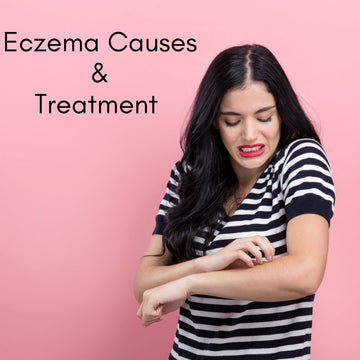By Dr. Nirvana S. Pillay, Medical Scientist & Founder of Nirvana Natural Bliss
What causes eczema?
Eczema is a skin condition rather than a skin type and is thought to be caused by a many factors including genetics, a weak immune system, and environmental triggers. These triggers make the skin's natural barrier less effective, which makes it less able to retain water than it should and the skin becomes drier and more sensitive. Some of the signs and symptoms of eczema include, dry and itchy skin, red rashes, bumps on the skin, scaly, leathery patches of skin or crusty skin.
How do you know if you have dry skin or eczema?
Eczema is best characterised as skin inflammation and typically manifests as a dry patch or red, itchy rash. Eczema is a little more unpredictable than dry skin types and can flare up at any time. When you're under stress, when you have an allergy like hay fever, or when you don't get enough sleep, your eczema can be worse. You might be able to identify a specific trigger over time, which could make it easier for you to control it.
What the best eczema creams should contain?
Some of the things that you need to look out for in a product is humectant, emollient and occlusive ingredients which reinforce the skin barrier ultimately helping you protect from irritants and that might trigger an eczema flare up.
Be careful with lanolin (wool fat) formulations as this may be an allergen for people with eczema, sodium lauryl sulfate (SLS) is a common ingredient in aqueous creams and are now thought to worsen eczema by causing stinging, itchiness and redness. Studies show that non-SLS aqueous creams are less likely to irritate skin that aqueous creams that contain SLS.
How to care for eczema-prone skin?
Try using cleansing products with very minimal ingredients and avoid artificial colourants, fragrances and harsh chemicals. Emollient-rich creams made to reduce skin inflammation and relieve itching should be used to treat eczema. Your doctor might prescribe steroid creams if your eczema is very bad, but you should stay away from items with strong scents and other harsh components on a daily basis.
Follow with an eczema cream all over your body and face to lock the hydration in.
You should also avoid exfoliating acids like glycolic, lactic and salicylic acids, harsh detergents or soaps and retinol. These can further irritate the skin and dry them out. Physical exfoliants such as sugar scrubs should also be avoided which can make eczema worse.
Recommended Products:

Related Guides :





